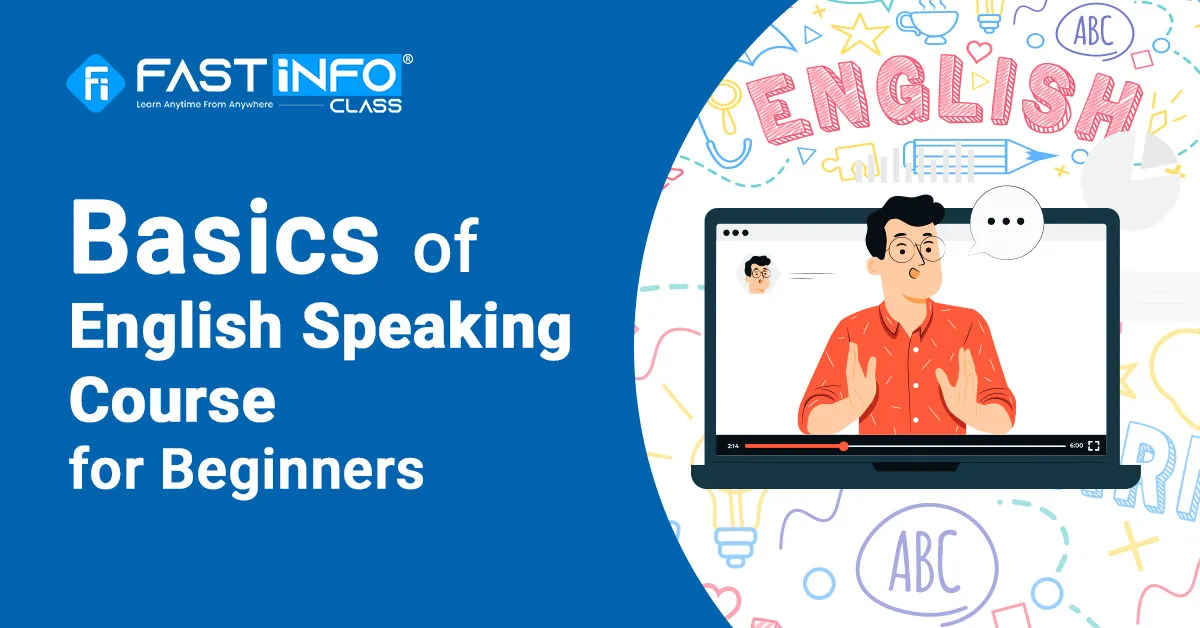Self Introduction in English for Job Interviews: A Guide
29 Dec, 2025
Welcome Offer for First Time Customers Get 15% off USE CODE: NEW15 AT CHECKOUT

Welcome Offer for First Time Customers Get 15% off USE CODE: NEW15 AT CHECKOUT

Welcome Offer for First Time Customers Get 15% off USE CODE: NEW15 AT CHECKOUT

Welcome Offer for First Time Customers Get 15% off USE CODE: NEW15 AT CHECKOUT

Welcome Offer for First Time Customers Get 15% off USE CODE: NEW15 AT CHECKOUT

Welcome Offer for First Time Customers Get 15% off USE CODE: NEW15 AT CHECKOUT

Welcome Offer for First Time Customers Get 15% off USE CODE: NEW15 AT CHECKOUT

Welcome Offer for First Time Customers Get 15% off USE CODE: NEW15 AT CHECKOUT


 By FastInfo Class
Published On 20 May 2025
Updated On 21 May 2025
Category English Speaking Tutor
By FastInfo Class
Published On 20 May 2025
Updated On 21 May 2025
Category English Speaking Tutor
Speaking English fluently isn’t just about knowing grammar rules or memorizing vocabulary, but about confidence, flow, and real-life communication. An English-speaking tutor plays an important role in helping learners bridge that gap. With personalized guidance, practical conversations, and ongoing support, a tutor can help you speak more naturally and clearly. Whether you are preparing for interviews, studying abroad, or simply want to express yourself better, a tutor will help you achieve it. In this article, you will learn how an English-speaking tutor can improve your fluency.
An English speaking tutor is a language expert who helps learners improve their spoken English through conversation-based practice, corrections, and personalized guidance. Unlike traditional teachers who focus more on grammar and writing, these tutors concentrate on building fluency, pronunciation, and speaking confidence. They work one-on-one or in small groups online, creating a comfortable environment where students can practice speaking freely, make mistakes, and improve naturally. Tutors often tailor lessons to suit each learner’s level, goals, and daily needs, whether it is a casual conversation, job interviews, or academic speaking. Their support makes speaking English easier, more natural, and truly effective over time.
Learning to speak English fluently can be difficult for some, even if they know the basics. Here are the most common challenges people face when trying to improve their spoken English:
One of the biggest obstacles is the fear of saying something wrong. Many people hesitate to speak because they worry about grammar errors, wrong pronunciation, or being judged. This fear creates mental blocks and reduces confidence, which makes fluency harder to build. Instead of focusing on communication, learners tend to overthink every sentence.
Solution: The best way to overcome this is through regular and supportive conversation. An English-speaking tutor helps in creating a safe space where you can speak freely and without fear.
Knowing English on paper doesn’t guarantee speaking fluency. Many learners don’t have real-world experience in speaking practice. Reading, listening, or writing helps in understanding, but without regular speaking, it is hard to build flow and comfort in speaking the language. Fluency needs practice just like any other skill.
Solution: An English speaking tutor gives you the chance to speak regularly with guidance. Even 30 minutes a day of speaking on common topics such as news, hobbies, or work can make a big difference. Tutors also correct and guide you on pronunciation, tone, and sentence flow in real time, which self-study apps can't do.
Having a small vocabulary can make conversations difficult. Learners might understand words when they read or hear them, but they can't remember them quickly during a conversation. This can lead to confusion, pause, or switching to their native language. Building an active vocabulary of words that you can use instantly is the key to your fluency.
Solution: Tutors help expand your vocabulary through practical usage. So instead of just telling you to memorize lists, they teach you important words. This way you remember them naturally and use them with confidence.
Before speaking, many people have tried translating their thoughts from their mother tongue to English. This process can slow down speech and can often lead to awkward sentence structures or grammatical errors. Speakers who are fluent in English can think directly, which takes time but becomes easier with continuous practice and exposure.
Solution: A tutor encourages you to think directly in English using simple sentence structures. They might ask you questions every day, and over time, these daily questions will train your brain to respond in English and not translate them into your native language.
Even if grammar and vocabulary are strong, unclear pronunciation can make the speed hard to understand. English has many sounds that do not exist in other languages. Mispronouncing these words or using flat intonation can lead to confusion or reduce the listener’s interest. Good pronunciation can help you deliver your message clearly and confidently.
Solution: An English-speaking tutor listens carefully and gently corrects your pronunciation, teaching you how to shape sounds and stress words naturally. With regular speaking practice and feedback, you slowly build clear, confident speech that is easier for others to understand.
While grammar is important, focusing too much on perfect sentence structure while you are speaking can interrupt your natural flow. Learners often pause mid-sentence to check if their grammar is correct, which affects fluency. In spoken English, it is more important to be clear and understood than trying to be perfect.
Solution: Tutors simplify grammar and focus on how it is used in conversation. Instead of explaining complicated rules, they teach through examples. For instance, they might help you understand tenses by asking you to describe your day (past), your routine (present), and your weekend plans (future). This way, the grammar is more practical and less stressful.
Even learners who are good at English sometimes struggle with low confidence. They may feel their accent is not good enough or compare themselves to fluent speakers. This mindset can lead to hesitation and avoidance of speaking opportunities, which can also slow down your progress.
Solution: A tutor builds your confidence gradually by focusing on your strengths, celebrating small wins, and giving positive feedback. With each session, your comfort will grow, and after a few successful conversations, you will naturally feel more confident speaking in front of others.
Understanding native speakers or fluent individuals who speak quickly can be difficult. Learners may miss idioms, words, or slang, which can cause anxiety in conversations and affect their ability to respond smoothly.
Solution: A tutor helps you get used to different speaking speeds by using real conversations, videos, and listening exercises. They explain slang and idioms in simple ways, so over time, you can understand speakers better and respond more confidently.
Without proper feedback, learners may keep repeating the same mistakes without even realizing it. Practising alone or with friends may not be enough if no one corrects their grammar, word choice, or pronunciation. Timely and kind corrections are important to improve fluency effectively.
Solution: A tutor gives you kind and clear feedback the moment you make a mistake. They explain what went wrong and how you can fix it, so you don’t keep repeating the same mistake. This helps you improve your English faster and speak more confidently and accurately every time.
Many learners are not regular with their speaking practice. They usually skip days of practice, or switch their learning methods very often can slow down their progress. Consistency is important, and focusing just 15 minutes a day to practice can make a huge difference over time.
Solution: An English speaking tutor helps you stay consistent by creating a fixed schedule and keeping you motivated. Even daily sessions for just 15 minutes help a lot to improve your fluency. With a tutor’s support, speaking practice can become a regular habit, not something you keep putting off.
The following details include how an English-speaking tutor can improve your fluency:
Tutors understand how nervous you might feel while speaking, especially in the beginning. They create a comfortable space where you are free to make mistakes and learn from them without judgment. With supportive, experienced tutors, you are encouraged to speak more, try more, and worry less as learning is a journey and not a test.
Every learner is different, and a good tutor doesn’t follow a one-size-fits-all method. They build a personalized learning path that fits your level, interests, and goals. Whether you are preparing for a job interview, travelling abroad, or improving general conversation, the lessons will be shaped accordingly to make your learning journey effective and relevant.
Fluency grows with practice, and tutors make sure you speak regularly and not just listen or read. Through live, interactive sessions, they guide you through real conversations, questions, and role plays that mimic real-life situations. Whether it’s a one-on-one class, a small super 3 group, or a group class, you will get the speaking time and attention you need.
Tutors don’t overload you with grammar rules. Instead, they use simple techniques that work, such as storytelling, quick responses, thinking in English, and fun speaking games. These tools help you stay engaged and make learning enjoyable, not stressful.
Instead of teaching complicated or outdated words, tutors focus on a complete and practical curriculum. You will learn everyday phrases, natural expressions, and useful vocabulary that you can use right away in your studies, work, or daily conversations.
Speaking clearly matters as much as speaking correctly. Tutors help you with pronunciation, accent, and tone, so your speech is easier to understand. Over time, you will notice your words flowing more smoothly, and people responding better to what you say.
One of the biggest benefits of learning with a tutor is flexibility. With flexible class timings, you can learn at your own pace, at a time that works for you. This makes it easier to stay consistent without disrupting your routine.
Tutors notice the small improvements you might miss and keep track of your growth to celebrate your efforts, and adjust your learning plan as you improve. This kind of goal-focused learning keeps you moving forward and builds confidence with every session.
Through mock interviews, presentation practice, and real-time speaking activities, your tutor prepares you for situations you will face in real life. Whether you are speaking in a classroom, at work, or while travelling, you will feel more ready and less nervous.
When someone is there to guide you regularly, it is easier to stay on track. Tutors help you stay committed, check in on your progress, and push you gently when needed. Having a tutor means you are not learning alone, and that makes all the difference.
Finding the right English-speaking tutor can make a big difference in how fast and confidently you speak the language. Here are some tips to help you choose the right tutor for your English fluency journey:
Learning to speak English fluently is not just about being perfect, but it is about growing with the right support. An English speaking tutor helps you practise regularly, guides you kindly, and builds your confidence step by step. They create a safe space where mistakes are welcome and learning feels natural.
With their help, your vocabulary, pronunciation, and fluency will improve in real conversations. Whether for school, work, or travel, the right tutor can truly change your journey with English. In this article, you have learned how an English speaking tutor can improve your fluency. Join FastInfo Class, and learn from the best tutors across the nation and improve your English speaking skills rapidly.

Self Introduction in English for Job Interviews: A Guide
29 Dec, 2025

10 Effective Ways to Improve IELTS Vocabulary
05 Dec, 2025

Common IELTS Speaking Topics & Questions for 2025-2026
02 Dec, 2025

Common Idioms and Phrases for IELTS
02 Dec, 2025

Best Conversation Topics In English For Daily Use
02 Dec, 2025

Daily English Conversation Practice for Beginners: 50 Useful Topics
29 Jun, 2023

Must Read Novels to Improve English for Beginners to Advanced
21 Feb, 2023

Top 15 Spoken English Books to Enhance Your Fluency
09 Sep, 2023

English Speaking Course for Beginners - Everything you must know
22 Sep, 2021

25 Commonly Mispronounced English Words in India
26 Apr, 2024